Related Research Articles
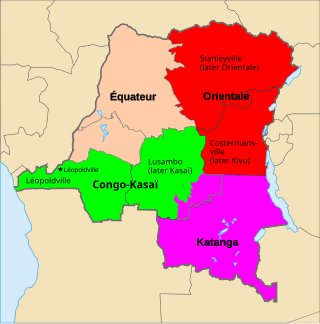
Katanga was one of the four large provinces created in the Belgian Congo in 1914. It was one of the eleven provinces of the Democratic Republic of the Congo between 1966 and 2015, when it was split into the Tanganyika, Haut-Lomami, Lualaba, and Haut-Katanga provinces. Between 1971 and 1997, its official name was Shaba Province.

The Congo River, formerly also known as the Zaire River, is the second-longest river in Africa, shorter only than the Nile, as well as the second largest river in the world by discharge volume, following only the Amazon. It is also the world's deepest recorded river, with measured depths of around 219.5 m (720 ft). The Congo-Lualaba-Chambeshi River system has an overall length of 4,700 km (2,920 mi), which makes it the world's ninth-longest river. The Chambeshi is a tributary of the Lualaba River, and Lualaba is the name of the Congo River upstream of Boyoma Falls, extending for 1,800 km (1,120 mi).

Kinshasa, formerly Léopoldville, is the capital and largest city of the Democratic Republic of the Congo. Once a site of fishing and trading villages situated along the Congo River, Kinshasa is now one of the world's fastest growing megacities.

Brazzaville is the capital and largest city of the Republic of the Congo. Constituting the financial and administrative centre of the country, it is located on the north side of the Congo River, opposite Kinshasa, the capital city of the Democratic Republic of the Congo.

The Belgian Congo was a Belgian colony in Central Africa from 1908 until independence in 1960. The former colony adopted its present name, the Democratic Republic of the Congo (DRC), in 1964.

The total number of languages natively spoken in Africa is variously estimated at between 1,250 and 2,100, and by some counts at over 3,000. Nigeria alone has over 500 languages, one of the greatest concentrations of linguistic diversity in the world. The Languages of Africa belong to many distinct language families, among which the largest are:

The Democratic Republic of the Congo (DRC), also known as Congo-Kinshasa and formerly known as Zaire, is a country in Central Africa bordered to the west by the South Atlantic Ocean. By land area, the DRC is the second-largest country in Africa and the 11th-largest in the world. With a population of around 112 million, the Democratic Republic of the Congo is the most populous officially Francophone country in the world. The national capital and largest city is Kinshasa, which is also the nation's economic center. The country is bordered by the Republic of the Congo, Central African Republic, South Sudan, Uganda, Rwanda, Burundi, Tanzania, Zambia, Angola, and the Cabinda exclave of Angola.
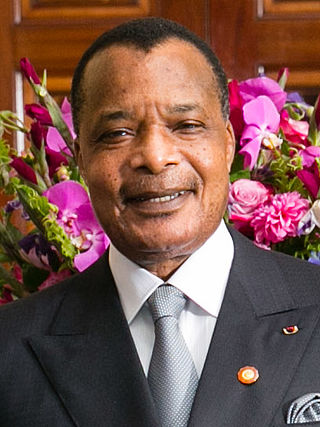
Denis Sassou Nguesso is a Congolese politician and former military officer. He became president of the Republic of the Congo in 1997. He served a previous term as president from 1979 to 1992. During his first period as president, he headed the Congolese Party of Labour (PCT) for 12 years. He introduced multiparty politics in 1990, but was stripped of executive powers by the 1991 National Conference, remaining in office as a ceremonial head of state. He stood as a candidate in the 1992 presidential election but placed third.

Joseph Kabila Kabange is a Congolese politician who served as President of the Democratic Republic of the Congo between January 2001 and January 2019. He took office ten days after the assassination of his father, President Laurent-Désiré Kabila in the context of the Second Congo War. He was allowed to remain in power after the 2003 Pretoria Accord ended the war as the president of the country's new transitional government. He was elected as president in 2006 and re-elected in 2011 for a second term. Since stepping down after the 2018 election, Kabila, as a former president, serves as a senator for life.

The president of the Democratic Republic of the Congo, is the head of state of the Democratic Republic of the Congo and commander-in-chief of the armed forces.

Lubumbashi is the second-largest city in the Democratic Republic of the Congo, located in the country's southeasternmost part, along the border with Zambia. The capital and principal city of the Haut-Katanga Province, Lubumbashi is the center of mining in the region, acting as a hub for many of the country's largest mining companies. No definite population figures are available, but the population of the city's urban area is estimated to be around 2,584,000 in 2021.
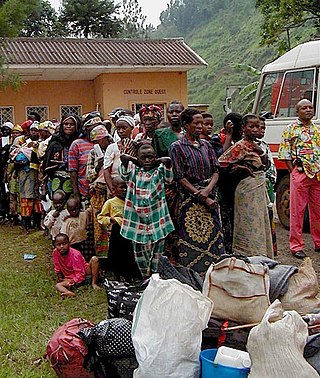
The Second Congo War, also known as the Great War of Africa or the Great African War and sometimes referred to as the African World War, began in the Democratic Republic of the Congo in August 1998, little more than a year after the First Congo War, and involved some of the same issues. The war officially ended in July 2003, when the Transitional Government of the Democratic Republic of the Congo took power. Although a peace agreement was signed in 2002, violence has continued in many regions of the country, especially in the east. Hostilities have continued since in the ongoing Lord's Resistance Army insurgency, and the Kivu and Ituri conflicts. Nine African countries and around twenty-five armed groups became involved in the war.

The United Nations Organization Stabilization Mission in the Democratic Republic of the Congo or MONUSCO, an acronym based on its French name Mission de l'Organisation des Nations Unies pour la stabilisation en République démocratique du Congo, is a United Nations peacekeeping force in the Democratic Republic of the Congo (DRC) which was established by the United Nations Security Council in resolutions 1279 (1999) and 1291 (2000) to monitor the peace process of the Second Congo War, though much of its focus subsequently turned to the Ituri conflict, the Kivu conflict and the Dongo conflict. The mission was known as the United Nations Mission in the Democratic Republic of Congo or MONUC, an acronym of its French name Mission de l'Organisation des Nations Unies en République démocratique du Congo, until 2010.

The DR Congo national football team, recognised by FIFA as Congo DR, represents the Democratic Republic of the Congo in men's international football and it is controlled by the Congolese Association Football Federation. They are nicknamed the Leopards. The team is a member of FIFA and the Confederation of African Football (CAF).
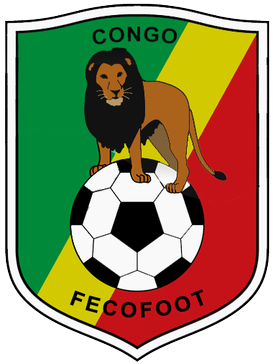
The Congo national football team represents the Republic of the Congo in men's association football and is governed by the Congolese Football Federation. They have never qualified for the World Cup, but did win the Africa Cup of Nations in 1972. They also won the All-Africa Games football tournament in 1965. The team is also a member of both FIFA and the Confederation of African Football (CAF).

Article 2 of the Constitution of the Democratic Republic of the Congo divides the country into the capital city of Kinshasa and 25 named provinces. It also gives the capital the status of a province. Therefore, in many contexts Kinshasa is regarded as the 26th province.
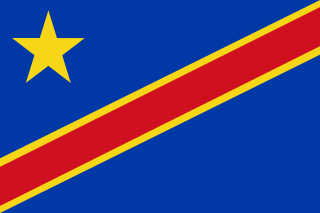
The Republic of the Congo was a sovereign state in Central Africa, created with the independence of the Belgian Congo in 1960. From 1960 to 1966, the country was also known as Congo-Léopoldville to distinguish it from its northwestern neighbor, which is also called the Republic of the Congo, alternatively known as "Congo-Brazzaville". In 1964, the state's official name was changed to the Democratic Republic of the Congo, but the two countries continued to be distinguished by their capitals; with the renaming of Léopoldville as Kinshasa in 1966, it became also known as Congo-Kinshasa. After Joseph Désiré Mobutu, commander-in-chief of the national army, seized control of the government, the Democratic Republic of the Congo became the Republic of Zaire in 1971. It would again become the Democratic Republic of the Congo in 1997. The period between 1960 and 1964 is referred to as the First Congolese Republic.

The Kivu conflict began in 2004 in the eastern Congo as an armed conflict between the military of the Democratic Republic of the Congo (FARDC) and the Hutu Power group Democratic Forces for the Liberation of Rwanda (FDLR) in the Democratic Republic of the Congo. It has broadly consisted of three phases, the third of which is an ongoing conflict. Prior to March 2009, the main combatant group against the FARDC was the National Congress for the Defence of the People (CNDP). Following the cessation of hostilities between these two forces, rebel Tutsi forces, formerly under the command of Laurent Nkunda, became the dominant opposition to the government forces.

The Republic of the Congo, also known as Congo-Brazzaville, the Congo Republic or simply either Congo or the Congo, is a country located on the western coast of Central Africa to the west of the Congo River. It is bordered to the west by Gabon, to its northwest by Cameroon and its northeast by the Central African Republic, to the southeast by the Democratic Republic of the Congo, to its south by the Angolan exclave of Cabinda and to its southwest by the Atlantic Ocean.

Félix Antoine Tshisekedi Tshilombo is a Congolese politician who has been the President of the Democratic Republic of the Congo since 24 January 2019. He is the leader of the Union for Democracy and Social Progress (UDPS), the DRC's oldest and largest party, succeeding his late father Étienne Tshisekedi in that role, a three-time Prime Minister of Zaire and opposition leader during the reign of Mobutu Sese Seko. Tshisekedi was the UDPS party's candidate for president in the December 2018 general election, which he was awarded, despite accusations of irregularities from several election monitoring organisations and other opposition parties. The Constitutional Court of the DRC upheld his victory after another opposition politician, Martin Fayulu, challenged the result, but Tshisekedi has been accused of making a deal with his predecessor, Joseph Kabila. The election marked the first peaceful transition of power since the state became independent from Belgium in 1960.
References
- ↑ Janson, Marlies; Opitz, Helmut (1 January 2007). World Guide to Special Libraries. Walter de Gruyter. ISBN 9783110917857 – via Google Books.